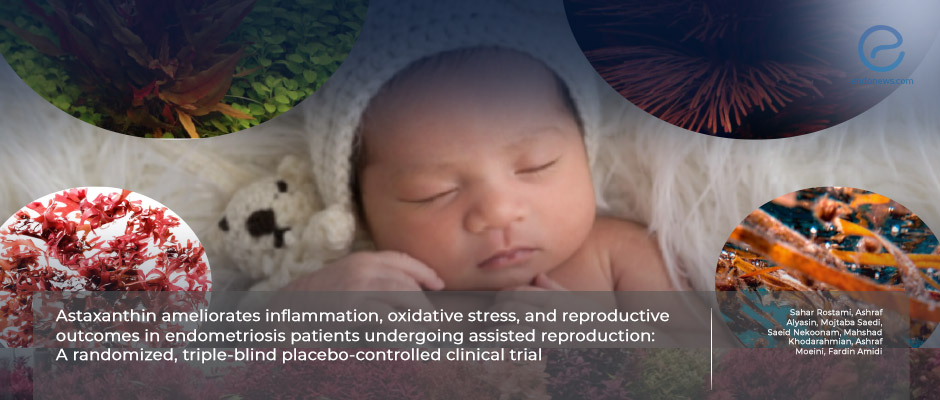Antioxidant astaxanthin has promising effects on endometriosis-related infertility.
Apr 20, 2023
Pioneering clinical study on the effects of antioxidant astaxanthin supplementation in infertile endometriosis patients yielded beneficial results
Key Points
Highlights:
- Astaxanthin, a ketocarotenoid obtained from an alga has potent antioxidant activity, and it also exerts immunomodulatory, anti-inflammatory, anti-proliferative, antiapoptotic, and neuroprotective effects.
- Surprisingly, fertility-enhancing properties have also been established in various in vitro and in vivo studies.
Importance:
- A complicated network of molecular, cellular, and hormonal factors affect declined reproductive outcomes of endometriosis patients.
- Astaxanthin well deserves a clinical trial due to its potential extraordinary healing properties on various disease mechanisms.
What's done here:
- The authors have conducted a randomized placebo-controlled triple-blind clinical trial on 50 infertile endometriosis candidates for assisted reproduction techniques.
- The effect of astaxanthin supplementation on oxidative stress, inflammation, and early pregnancy outcomes following assisted reproduction were evaluated.
Key Results:
- Astaxanthin pretreatment can modulate inflammation and oxidative stress in endometriosis-induced infertility.
- Assisted reproduction outcomes after 12 weeks of supplementation were improved.
Potential limitations of the study:
- The inclusion of only assisted reproduction patients may not give permit extrapolation to the entire endometriosis patient population.
- A larger sample size is required to analyze pregnancy outcomes including live birth rate.
Lay Summary
Dr. Rostami and colleagues from the Tehran University of Medical Sciences, Iran, have published a pioneering clinical study on the effects of antioxidant astaxanthin supplementation in infertile endometriosis patients in the scientific journal named Frontiers in Endocrinology.
A complicated network of molecular, cellular, and hormonal factors operate in the pathogenic mechanisms for lowered reproduction in endometriosis patients: Endometriosis occurs in an inflammatory microenvironment, in addition to the oxidative stress and high iron content from red blood cells, along with menstrual tissue debris in the peritoneal cavity.
Astaxanthin is a ketocarotenoid obtained from an alga and has potent antioxidant activity, and exerts great immunomodulatory, anti-inflammatory, anti-proliferative, antiapoptotic, anti-diabetic, and neuroprotective effects. Besides, fertility-enhancing properties of astaxanthin have been established in various in vitro and in vivo studies.
In a blind, randomized, placebo-controlled clinical trial of 50 infertile women with endometriosis undergoing assisted reproductive techniques, the effects of Astaxanthin supplementation on inflammation-related cytokines, oxidative stress markers, and early pregnancy outcomes were analyzed using a control group. Pro-inflammatory cytokines, oxidative stress markers, and total antioxidant capacity were measured both in the serum and follicular fluid in each patient before and after 12 weeks of assisted reproduction treatment with oral astaxanthin.
The astaxanthin supplementation group had an improved number of oocytes retrieved, an increased number of mature oocytes, and high-quality embryos.
The authors suggest that astaxanthin pretreatment can heal inflammation and oxidative stress in endometriosis-induced infertility besides improving assisted reproduction outcomes following a 12-week of supplementation based on this first randomized, triple-blind, placebo-controlled clinical trial.
Research Source: https://pubmed.ncbi.nlm.nih.gov/37020589/
Astaxanthin endometriosis infertility ketocarotenoid assisted reproductive techniques

